Juicing has become one of the hottest trends of the health market these days and there’s a good possibility that you’re looking at buying your own juicer.
Deciding that you want to juice is already a great first step. But now you’re probably left wondering what the best type of juicer is. There are so many on the market and they all have different features. So which one is right for you?
Before buying a juicer, you’ll want to ask yourself a few questions.
- How much time are you willing to put into juicing?
- Will your juice be a quick healthy snack or a health ritual that you’re looking to put your effort into?
- Is extracting the most juice from your fruits and vegetables and obtaining the highest amount of nutrients important to you? Or does convenience trump all?
Once you’ve considered your answer to each question, read on (or watch the video below) to see which juicer fits your needs the best.
There are four different major kinds of types of juicers: a centrifugal force juicer, masticating juicer, twin gear juicer, and a juice press. Keep scrolling to see the pros and cons of each type of juicer.
Juicing Types Comparison
Style | Juicing Method | Juice Quality | Price |
Centrifugal | Spins at a high speed, throwing the fruit and vegetables against a screen, extracting juice by centrifugal force. | Low - the most amount of separation and shortest shelf life. | $ |
Masticating and Twin Gear | A slow turning screw pushes the fruit and vegetables against a metal screen, extracting juice by force. | Medium - some separation, high amount of "solids" in the juice, medium shelf life. | $$ |
Juice Press | A two stage process: The first stage grinds the fruit and vegetables into a press bag, the 2nd stage applies pressure slowly, extracting juice by squeezing. | Highest - the lowest amount of separation, and less than 1% "solids" in the juice. Longest shelf life. | $$$ |
Note: Are you researching juicers in preparation for starting a juice business? Get 3 free juice business design guides that will help you get started on laying out your juice business, regardless of how big of an operation you’re planning.

Centrifugal Force Juicer
A centrifugal juicer, also known as a fast juicer, is the most popular type of home juicer. The biggest selling point is the fact that they are a cheap juicer to buy.
It takes the fruits and vegetables through a feed tube and directly into contact with a blade that shreds them at 6,000-14,000 RPM. The juice is thrown by the centrifugal force of the spinning basket towards the sides and pushed through a sharp screen into a jug or glass. The juice that is made from a centrifugal juicer tends to separate quickly and includes up to 30% solids including skins, seeds, and stems.
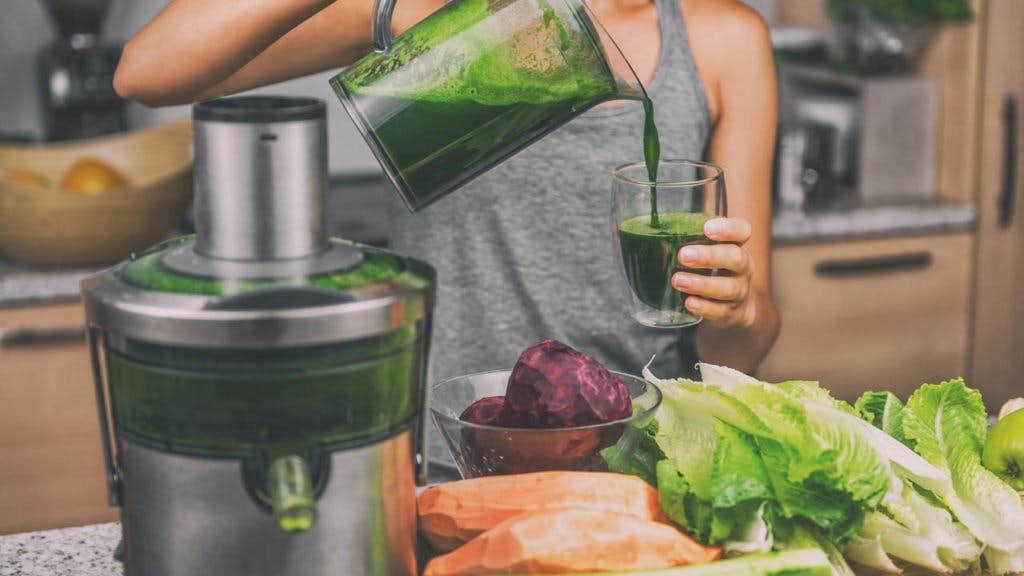
Pros
- They are fastest at extracting juice from fruits and vegetables, especially if you have one with a tube that is wide enough to take on whole small apples, cucumbers, or oranges
- They stand upright so they take up minimal space on your kitchen counter
- They tend to be the least expensive juicers since they are cheap to make
Cons
- The speed of rotation causes heat that degrades the quality of juice produced
- More oxidation takes place, creating a foam on top of the fresh juice and causing it to separate quickly
- They can be quite noisy
- They don’t handle leafy greens or wheatgrass very well
- The juice won’t stay fresh for very long, separating in a matter of minutes
- Juice contains a high amount of solids or “pulp” and indigestible fiber
- Nuts and seeds are not recommended to be juiced in this type of juicer, so making nut milk on a centrifugal juicer is a no-go
This juicer is best for people on a budget who don’t need large batches of juice and want to drink their juice as soon as it is made. It’s also for people who want to juice for the nutritional benefits but want to do it with as little effort as possible. They’re also cheaper than other options out there, making them great for juicing beginners.
Masticating Juicer
Masticating juicers are also known as the slow juicers. They use a slow auger (gear) to crush fruits and veggies and force against and through a sharp screen at 80 to 100 RPM. The juice is a pulpy, foamy product that can be bitter to taste and has a thick and chunky mouth-feel. Many brands of masticating juicers market them as “cold-pressed”, while they don’t actually contain a press at all.
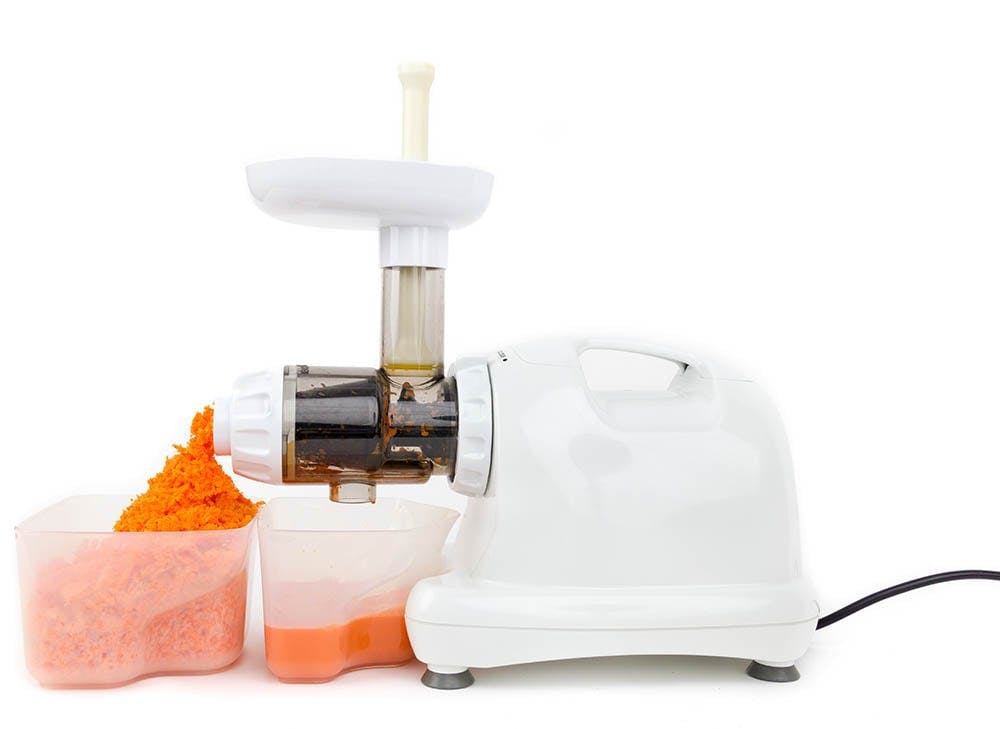
Pros
- They have a higher juice yield than centrifugal
- Can juice greens such as spinach, kale, and wheatgrass
- Less oxidation than centrifugal
- Juices tend to last longer than centrifugal
- They can function as grain mills so you can make nut butter or baby food
- Can be used to make nut milks
- They can process frozen fruits for instant frozen treats
Cons:
- There’s a smaller chute so they require more prep work
- They’re more expensive than centrifugal
- They can be hard to clean
- They’re slower because they take more time to extract the juice
- Takes can take up more counter space & can be very bulky
- Juice contains a high amount of solids or “pulp” and indigestible fiber, making your system work harder to absorb nutrients
This juicer is ideal for the person who’s looking to maximize the nutrients of their juices and are willing to spend a little more time doing it.
Twin Gear Juicer
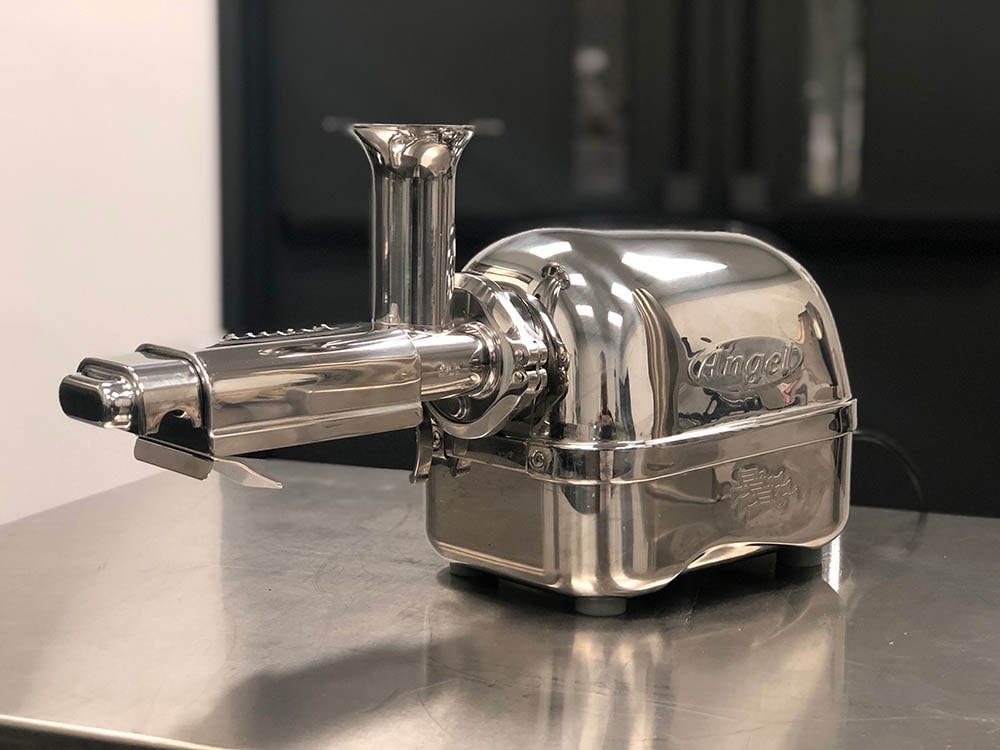
Twin gear juicers utilize two gears (augers) that spin and pulls the produce in and chews it up. The augers extract the juice by pushing the produce into an through a decreasing size screen. This causes nasty stuff to get through, adulterating the juice with up to 30% solids including skins, seeds, and stems.
Pros
- Believed to extract more nutrients than centrifugal or slow juicers
- They can make baby food, nut butter, sorbets, and pasta
- They’re quiet
Cons
- They’re more expensive than centrifugal or slow juicer
- They’re slow
- They take up more counter space than a centrifugal juicer
- They’re harder to clean than single-gear machines
- The juice contains a high amount of solids or “pulp” and indigestible fiber
Whether It’s Masticating, Twin Gear, or Centrifugal Juicers, They All Have One Thing in Common: They Extract Juice by Forcing the Plants Against a Sharp Screen. Many Brands of Screen Extractors Market Themselves as “Cold-Pressed”, While They Don’t Actually Contain a Press at All.
Juice Press
A hydraulic or pneumatic juice press is the best type of juicer you can buy. Juice Presses are also commonly referred to as two-stage juicers since there are two stages: First the produce is ground up into pulp, then the juice is slowly extracted by pressing the pulp under thousands of pounds of pressure. A juice press is where the term “cold-press” juicer came from, even though it’s now used for other types of juicers as well. A juice press is the only type of juicer that actually contains a press, and therefore is the only true cold-press juicer.
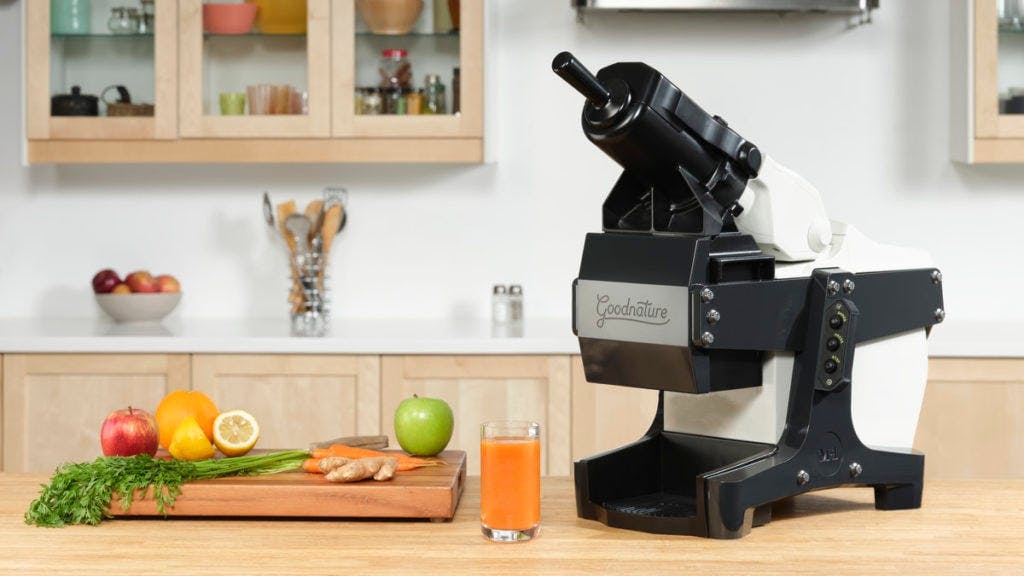
Pros
- Extracts the most nutrients possible from fruits and vegetables
- Longest shelf life – store juice in a refrigerator for 3-5 days with minimal separation or breakdown of nutrients and taste
- Creates little to no foam in the juice
- Minimal oxidation
- Can achieve the highest yield out of hard-to-juice items like leafy greens
- Creates the most pure juice with 99% liquid, and less than 1% solids or “pulp”
- Can be used to make dairy free milk beverages from nuts, hemp seed, oats and soy
- Can be used to make nut oils
Cons
- The most expensive type of juicer
- Current home / consumer juice presses are somewhat cumbersome to use and clean. Commercial machines like Goodnature brand are much faster and easier to clean, but might be too expensive for some home users.
- Require the use of reusable or limited-use press bags to hold the pulp
If you’re interested in juicing and you want to look into a high-quality commercial juice presses, you can find Goodnature’s juicers here!
Or, if you’re looking for some amazing and delicious creations to make with your juicer, browse our juicing recipes here!
Note: If you're planning to start a juice business, let us help you with these 3 free juice business design & equipment guides. We've helped hundreds of new juice businesses get started and we're happy to do the same for you.

Comments
Interesting
Great information ! Answered all of my questions I was curious about ! Thank you
Want juice grapes
Hi Jack,
If you're looking for juice recipes, check out our chef created recipes here: https://www.goodnature.com/recipes/ We have a few that include grapes!
Need the price of twin juicer
Hi Richmann,
We specialize in juice presses, you can find them here: https://www.goodnature.com/juice-presses/
does masticating juicers lose efficiencies? I used omega and tribest (top lines). they were all good at the beginning (pulp were very dry), but after just couple of months use, the pulp is getting wet and wet, so the juice is getting less and less. I wonder if this is normal or I am just in bad luck by getting bad machines?
Hi Jan,
I’m not sure if what you are experiencing is typical of masticating juicers, but it does not sound like something that should be happening! I had pretty good luck with a top end Omega juicer, although now I use a Goodnature juice press and I get more yield and the juice is clean and tastes much better!
Do you have a small size for home use?
Hi Kathy,
The M-1 is our smallest juicer. While it is a commercial machine built for juice bars, a lot of serious juicers do use them as a home juicer (including me). It is about a foot wide and is 22" high and 25" deep. You can learn more about it here: https://www.goodnature.com/juice-presses/m1/
I need 1 Goodnature m-1 presser machine.
I'm a resident of Nigeria in Delta State, Asaba
Hi Okobaroh, a team member will reach out to you by email, thank you!
Invent a smaller m1 good nature at an affordable price , you sure to get business, I will buy for sure!
Thanks Bertie 😄
looking for a juicer for installing in shop (commercial) @ Goa, India.
what is contact number of your dealer in India?
Hi Albert,
We sell and ship direct to India from our headquarters in the United States. You can reach us at +1 800-875-3381. One of our team members will reach out via email as well, thanks!
I'm looking to develop a healthier lifestyle and want to start juicing wheatgrass. I think a masticating juicer would be the best option given the awesome benefits of the slow juicer.
Which brand would you recommend for this?
Thanks for the wonderful read.
Hi Jerome,
If you are going to be juicing straight wheatgrass, you can find quite a selection of affordable, manual juicers online. If you are thinking about juicing other ingredients as well, I personally would recommend either the omega or kuvings brands for masticating juicers. I used an Omega for over 8 years before getting my Goodnature M-1. My mother has been using the Kuvings for just over a year now and she likes it. Happy juicing!
Thanks for the reviews!
Glad you found them helpful!
Hi.
Which juicer brand will you recommend for home use?
Hi Prof Shaesta,
A true juice press that makes cold press juice is going to be the best type of juicer you can buy, and you can find Goodnature's presses here: https://www.goodnature.com/juice-presses/ Even though these are commercial juicers, some people do use the M-1 in their home since it fits comfortably in a kitchen. However, they are the largest investment, and if they are not in your range of budget, you may consider a masticating or twin gear juicer for around $300. There are many available on the market, I would suggest reading the user reviews to help determine which one is the best for you. Happy Juicing!
Thank you for all the informative materials that you supply to this industry. I just bought your M1 for my new café that will open in a few months. I am so impressed with the easy to break down design and extremely impressed with the quality of the juice. I’m so excited to play with this thing! I was wondering what you think of the Norwalk juicer and how it fits in to the categories you describe above? I’ve had one at home for over 10 years and I think it is a good option for home use, although it seems a bit fiddly and takes time to get used to. It seems to me the quality of the juice is similar to yours - how would you comment?
Thank you.
Hi Lynne,
So great to hear, glad you are enjoying your new M-1!
The Norwalk juicer is a non-commercial cold press juicer and I think the quality of juice is quite good for a home juicer! The Norwalk is pretty labor and time intensive when it comes to operating and cleaning compared to the Goodnature juicers which are quite easy to use and to clean, but other than that, I would say it is a good option for home use.
Thank you for the information. I was trying to buy a new juicer. But I was kind of confused of what kind of juicers I should buy for green juicung. I wan to preserve as much nutritions as possible. So as al the information suggest that I should buy a Twin gear, masticating juicers. The thing that I wanted to know is, I heard this thing is expensive, Is it worth buying? or there are other alternative to this. Thank you.
Hi Whitney,
That is great to hear that you are investing in your health and are researching the best juicer for the most nutritious juice. A true juice press that makes cold press juice is going to be the best type of juicer you can buy, you can find them here: https://www.goodnature.com/juice-presses/ However, they are the largest investment, and if they are not in your range of budget, you may consider a masticating or twin gear juicer for around $300. There are many available on the market, I would suggest reading the user reviews to help determine which one is the best for you. Happy Juicing! 😄
very well written article thanks for sharing the information share some juice recipe too
Hi Siddy,
You can find our juice recipes here: https://www.goodnature.com/recipes/ 😄
very well written blog brother it helped me in understanding juicer please make another blog on juicer also
The information isn't accurate. Masticating juicers are known for having the LEAST amount of pulp in the juice, not a high amount.
Compared to what? Centrifugal?
They cannot possibly be comparing it to a real juice press. More info can be found here: goodnature.com/difference
Wow, this is such a comprehensive post along with the rest of the site as well actually! It really helped me out with some research I was doing. When you say cold press juicers are slower than centrifugal, how much slower are we talking? What is a rough estimate of the average time I should expect a slow juicer to make a glass of juice? Thanks!
Hi Sophie,
The difference in time it takes for the centrifugal to process a glass of juice vs. a slow juicer is very minimal...there is maybe a minute, minute and a half difference (I have both types of juicers at home). The big reason people talk about the speed in which the produce is processed when making juice is because of the heat and oxidation (which is said to damage some of the nutrients in juice) that is caused by centrifugal juicers using higher speeds and friction.
Amazing information! I feel as though I learned from an online webinar! I pray that you continue sharing life changing and life inspiring inspiration!
I believe God created everyone for a purpose and you are definitely living on purpose!
I'm continuing to learn as much as I can about the juicing industry to prepare myself to open a juice/smoothie bar that will make an impact in a food desert!
Thank You
Terry Garrett
Thank you Terry, that means a lot. We feel very fortunate to be able to share our experiences with the benefits of juicing to help inspire others:) Best wishes on your juice and smoothie bar endeavor, let us know if we can be of assistance!
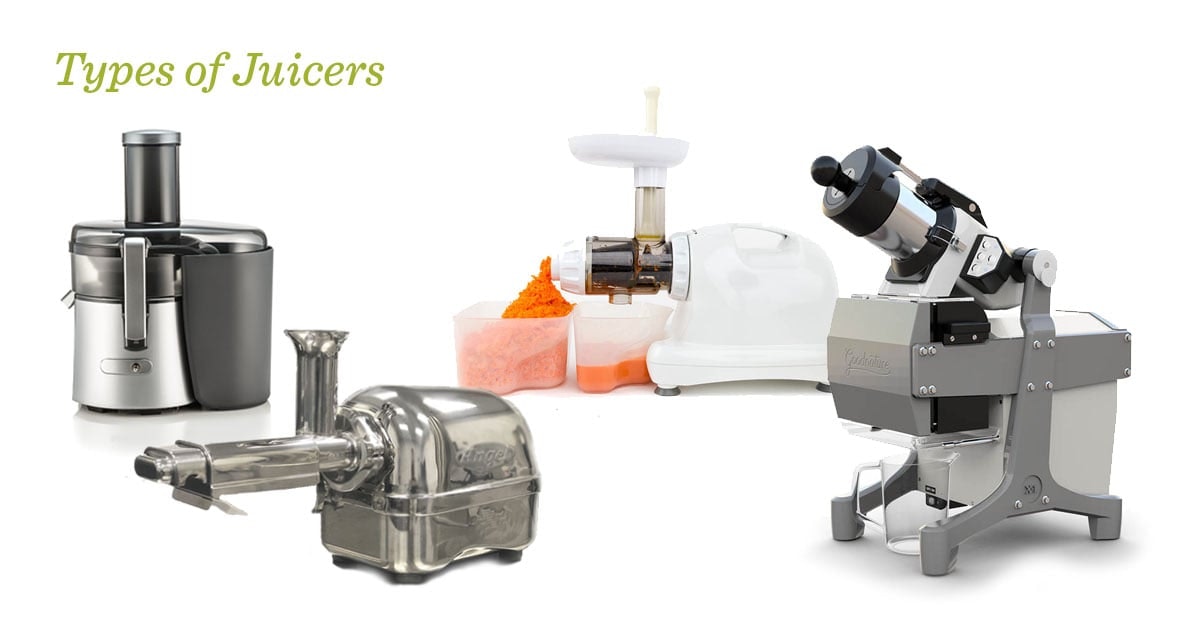
Comment